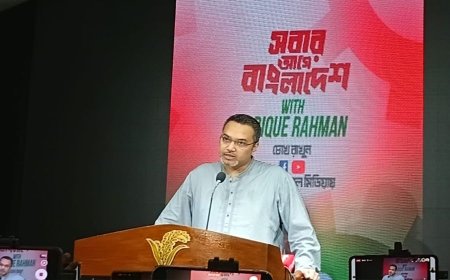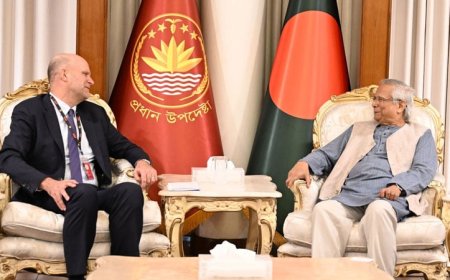Yunus in London: Who Is Accountable for the Diplomatic Blunder?
Yunus in London: Who Is Accountable for the Diplomatic Blunder?

When the BBC’s Rajini Vaidyanathan asked Professor Muhammad Yunus — head of Bangladesh’s interim government — during his recent London visit why he was meeting the King but not the Prime Minister, it was an awkward moment for many. Yet, without missing a beat, and without any trace of irritation — as clearly audible on the broadcast — Professor Yunus responded: “Well, we would be very happy to meet him. Somehow, probably he is busy or whatever. But that gives me a great opportunity too — now that he is busy, I invite him to come to Bangladesh.” A witty answer, certainly, but not a particularly satisfying one.
Rajini pressed further: “What reason does Downing Street give for not arranging the meeting?” Yunus replied, “I don't think we've received any explanation. Probably he is busy with other important things.” This exchange underscored the foreign ministry's failure to secure a crucial meeting during the chief adviser’s visit to a country with which Bangladesh shares deep historical and diplomatic ties.
The UK-Bangladesh relationship goes beyond trade, finance, or its sizable diaspora. The historical context of colonial rule continues to shape bilateral ties. High-level political visits are not mere formalities; they are critical diplomatic engagements that require meticulous planning — from setting agendas and confirming appointments to managing protocol and cultural sensitivities. According to the British Foreign, Commonwealth and Development Office, preparations for full state visits can take up to four years due to their complexity — though this visit, of course, was not a state visit but an official one.
Criticism of the interim government for this diplomatic lapse is not simply political point-scoring; it reflects genuine concern over a lost opportunity to deepen strategic ties. Acting Foreign Secretary Md Ruhul Alam Siddique acknowledged this on Tuesday, admitting that the ministry bore some responsibility for failing to arrange a meeting between Chief Adviser Yunus and British Prime Minister Keir Starmer. “As it was our responsibility to organise the visit, we are to some extent responsible for the meeting not taking place, as was announced on our side at the beginning of his visit to the UK,” Siddique told reporters, according to New Age. However, this partial admission leaves several key questions unanswered: Was a meeting ever formally requested? Was it merely assumed to happen? Did the Bangladeshi side know that Prime Minister Starmer would be deeply engaged with the spending review in Parliament? Whoever in the foreign ministry authorised upgrading the trip to an official visit without confirming high-level appointments must be held accountable for this diplomatic failure.
Adding to the confusion was the absence of the foreign adviser from the delegation — a clear breach of protocol, particularly for visits to P5 capitals (the five permanent members of the UN Security Council). Neither the permanent foreign secretary nor the acting foreign secretary accompanied the chief adviser — a highly unusual and arguably irresponsible omission for a visit of this stature.
During her interview, Rajini also asked Professor Yunus about reports that MP Tulip Siddiq had requested a meeting to defend herself against corruption allegations that led to her losing a ministerial post — claims she called “a politically motivated smear campaign.” Professor Yunus declined to comment, citing the ongoing legal proceedings and the importance of respecting judicial independence. However, in contrast, his interview with the Financial Times struck a more political tone. The FT headline read: “Keir Starmer declines to meet Bangladesh leader tracking down missing billions.” In that interview, Yunus argued that the UK should feel morally obligated to assist in recovering funds allegedly embezzled during Sheikh Hasina’s rule.
Undoubtedly, as a Nobel Peace Prize laureate, Professor Yunus attracts international attention wherever he goes. His London visit — to receive the King Charles III Harmony Award and hold a private audience with the King — would likely have taken place even if he were not leading the interim government. Therefore, the foreign ministry deserves little credit for his engagements with British politicians, business leaders, academics, and the diaspora. What the ministry urgently requires is reform — to restore professionalism, competence, and accountability in managing Bangladesh’s foreign affairs.
While the visit may have produced few tangible diplomatic outcomes, it was politically significant on the domestic front. It offered some clarity on the interim government’s roadmap for restoring democratic governance through elections — an issue that has generated considerable uncertainty. Against this backdrop, the much-anticipated London meeting between Professor Yunus and long-exiled BNP Acting Chairman Tarique Rahman was a rare and promising signal. Their reported agreement to move forward with election plans has been welcomed by many as a hopeful step toward a peaceful political transition.
What's Your Reaction?




















































































